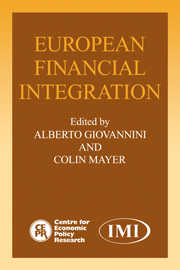Book contents
- Frontmatter
- Contents
- List of figures
- List of tables
- Preface
- List of conference participants
- Foreword
- 1 Introduction
- 2 Banking competition and European integration
- Discussion
- 3 Banking, financial intermediation and corporate finance
- Discussion
- 4 How (not) to integrate the European capital markets
- Discussion
- 5 European financial regulation: a framework for policy analysis
- Discussion
- 6 Corporate mergers in international economic integration
- Discussion
- 7 Capital flight and tax competition: are there viable solutions to both problems?
- Discussion
- 8 Reflections on the fiscal implications of a common currency
- Discussion
- 9 Currency competition and the transition to monetary union: does competition between currencies lead to price level and exchange-rate stability?
- 10 Currency competition and the transition to monetary union: currency competition and the evolution of multi-currency regions
- Discussion of chapters 9 and 10
- 11 Problems of European monetary integration
- Discussion
- Index
Discussion
Published online by Cambridge University Press: 04 August 2010
- Frontmatter
- Contents
- List of figures
- List of tables
- Preface
- List of conference participants
- Foreword
- 1 Introduction
- 2 Banking competition and European integration
- Discussion
- 3 Banking, financial intermediation and corporate finance
- Discussion
- 4 How (not) to integrate the European capital markets
- Discussion
- 5 European financial regulation: a framework for policy analysis
- Discussion
- 6 Corporate mergers in international economic integration
- Discussion
- 7 Capital flight and tax competition: are there viable solutions to both problems?
- Discussion
- 8 Reflections on the fiscal implications of a common currency
- Discussion
- 9 Currency competition and the transition to monetary union: does competition between currencies lead to price level and exchange-rate stability?
- 10 Currency competition and the transition to monetary union: currency competition and the evolution of multi-currency regions
- Discussion of chapters 9 and 10
- 11 Problems of European monetary integration
- Discussion
- Index
Summary
To what degree do the EC countries need to coordinate their fiscal policies as a result of their decision to create a monetary union? An effective monetary union eliminates each country's discretionary use of inflationary finance of any budget deficits. But should use of debt finance of budget deficits also be restricted? The Delors Commission report recommends that the Community impose an effective upper limit on the budget deficits of individual member countries, and occasionally suggests further restrictions. This paper by Buiter and Kletzer (hereafter BK) expresses substantial scepticism about the economic justification for any such restrictions. They examine a number of potential justifications for coordination of budget deficits, and dismiss each in turn. In this comment, I will examine each of these arguments.
Interest rate effects
To begin with, Casella (1989) among others argues that extra borrowing by one country raises the interest rate faced by all other countries, creating externalities which should be taken into account. BK respond that these spillovers are merely pecuniary externalities, with distributional but not efficiency consequences. They argue that this is ‘true even if policy authorities are “large” and deliberately try to influence market prices in the pursuit of national advantage’. But a pecuniary externality exists only when all decisions are made facing competitive prices. Certainly exercise of monopoly power has efficiency consequences. If a country can affect the world interest rate, then it has the incentive to reduce its net demand for loans, or its net supply of loans, in order to move the interest rate in a favourable direction.
- Type
- Chapter
- Information
- European Financial Integration , pp. 244 - 256Publisher: Cambridge University PressPrint publication year: 1991

